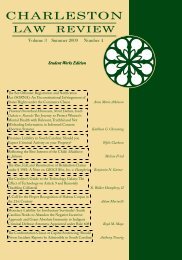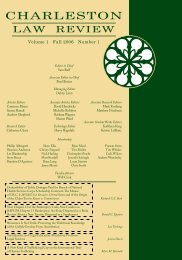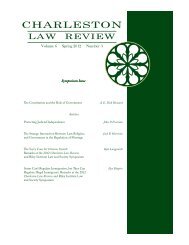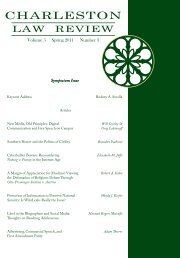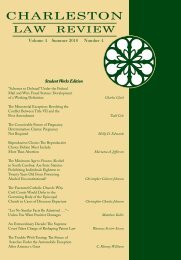Volume 5 Winter 2011 Number 2 - Charleston Law Review
Volume 5 Winter 2011 Number 2 - Charleston Law Review
Volume 5 Winter 2011 Number 2 - Charleston Law Review
You also want an ePaper? Increase the reach of your titles
YUMPU automatically turns print PDFs into web optimized ePapers that Google loves.
SCHULZE FINAL.doc1/20/<strong>2011</strong> 6:14PM<strong>2011</strong>] <strong>Law</strong> School Academic Supportindividuals prefer to use their perception and judgment.” 237Briggs and Briggs Myers developed the Myers-Briggs TypeIndicator (MBTI), which some ASPs use to help individualsunderstand their basic preferences “of each of the fourdichotomies specified or implicit in Jung’s theory” and to identifyand describe “the [sixteen] distinctive personality types thatresult from the interactions among the preferences.” 238 In usingthis instrument in law school, ASPs give students an even deeperunderstanding of how they, as individuals, learn new material,interact with others, and process information.For instance, at Elon University School of <strong>Law</strong>, the AcademicSkills Program incorporates personality typology in the lawschool orientation program. 239 During a half-day program,students focus on understanding the results of their MBTI test,which they have completed prior to the orientation. 240 A studentalso has the opportunity to self-assess his personality type andconsider why his self-assessment might differ from his MBTIresults. 241 Dr. Martha Peters, the Director of the Academic SkillsProgram, then conducts a series of exercises related to law schoolskills to demonstrate the utility of meta-cognition based onpersonality typology in law school studies. 242 For instance, sheseparates the introverts from the extroverts in the law schoollobby, and, as the introverts wait quietly for the exercise whilethe extroverts all talk with each other, Dr. Peters then discussesthe impact on law study of being either an introvert orextrovert. 243 Students are then further divided based upon theother personality dichotomies, such as intuitive versus sensing,and Dr. Peters discusses the impact of that particular personalitytype. 244237. MBTI Basics, MYERS &BRIGGS FOUND., http://www.myersbriggs.org/my-mbti-personality-type/mbti-basics (last visited Oct. 23, 2010).238. Id.239. Telephone Interview with Martha Peters, supra note 236.240. Academic Skills Program, ELON U. SCH. L., http://www.elon.edu/eweb/law/development/default1.xhtml (last visited July 30, 2010).241. Telephone Interview with Martha Peters, supra note 236.242. Id.243. Id.244. Id.325



